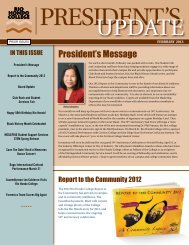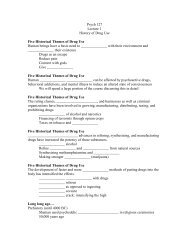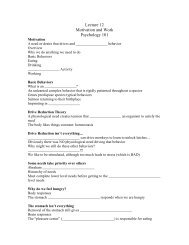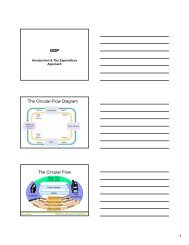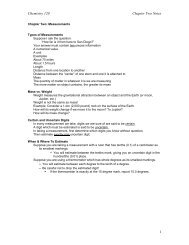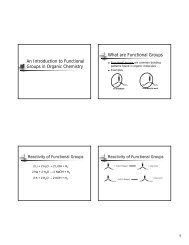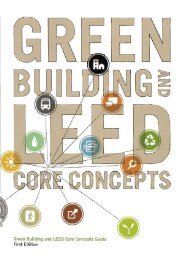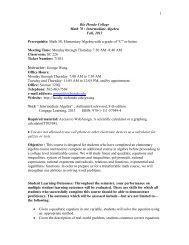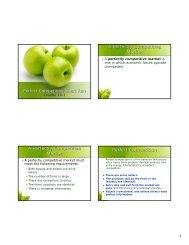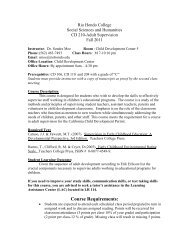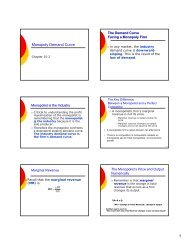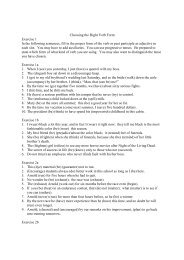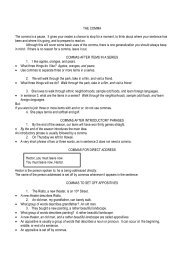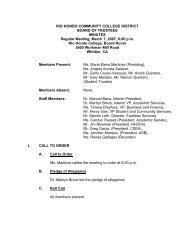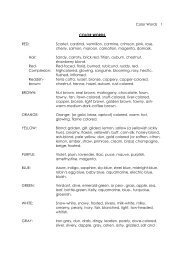Complete College Catalog 2011-2012 - Rio Hondo College
Complete College Catalog 2011-2012 - Rio Hondo College
Complete College Catalog 2011-2012 - Rio Hondo College
You also want an ePaper? Increase the reach of your titles
YUMPU automatically turns print PDFs into web optimized ePapers that Google loves.
NURSING PROGRAM OVERVIEW<br />
<strong>Rio</strong> <strong>Hondo</strong> <strong>College</strong> provides all<br />
qualified candidates who have<br />
applied for admission to any Health<br />
Science and Nursing program an<br />
equal opportunity to successfully<br />
complete their studies. There are,<br />
however, two limiting factors<br />
affecting selection which must be<br />
recognized by all students:<br />
1. The health, safety, and welfare of<br />
the community and the student<br />
must be a consideration in the<br />
selection process.<br />
2. <strong>College</strong> and community health<br />
facilities limit the number of<br />
candidates that can be admitted.<br />
<strong>Rio</strong> <strong>Hondo</strong> <strong>College</strong> shall give to student<br />
applicants credit in the appropriate<br />
field for previous education and the<br />
opportunity to obtain credit for other<br />
acquired knowledge by the use of the<br />
challenge examination. See Credit by<br />
Examination Procedure.<br />
Admission, transfer and credit by<br />
examination policies shall be posted<br />
in an area accessible to all interested<br />
persons. A copy of the policy may<br />
be obtained upon request. This<br />
information shall also be made<br />
available through the Counseling<br />
Department and on the <strong>Rio</strong> <strong>Hondo</strong><br />
<strong>College</strong> web site.<br />
Credit for Non-Collegiate<br />
Registered Nursing<br />
Training<br />
Credit may be granted to a student<br />
who has a valid California RN<br />
license for nursing courses taken<br />
at an accredited non-collegiate<br />
RN nursing program toward the<br />
Associate of Science Degree in<br />
Nursing. Credit granted may not<br />
exceed the total number of nursing<br />
units required for the Associate<br />
Degree in Nursing at <strong>Rio</strong> <strong>Hondo</strong><br />
<strong>College</strong>.<br />
Associate Degree<br />
Nursing Program<br />
The Associate Degree Nursing<br />
Program is a two-year program<br />
designed to prepare students for<br />
employment as a registered nurse<br />
providing direct care to patients.<br />
Graduates receive an Associate in<br />
Science Degree of Nursing. The<br />
program is accredited by the<br />
California Sate Board of Registered<br />
Nursing. Students who complete the<br />
curriculum are qualified to take the<br />
examination leading to licensure as a<br />
Registered Nurse.<br />
Philosophy<br />
The philosophy of the nursing<br />
program is in harmony with the<br />
mission, vision, and goals of <strong>Rio</strong><br />
<strong>Hondo</strong> <strong>College</strong>. The Associate Degree<br />
Nursing Program strives to be an<br />
exemplary nursing program that<br />
provides opportunities for students<br />
from diverse backgrounds, ethnicities<br />
and cultures to be educated,<br />
responsible and caring community<br />
members. Graduates are prepared for<br />
licensure as registered nurses. The<br />
faculty recognizes the importance of<br />
also preparing students to practice<br />
in a variety of settings as health<br />
care delivery evolves. Teaching/<br />
learning strategies will embrace<br />
student centered competency-based<br />
instruction. In addition, the program<br />
has established quality improvement<br />
measures to assure that educational<br />
competencies have been met.<br />
This nursing program embraces<br />
three major concepts to provide an<br />
organizational framework for the<br />
curriculum. The major concepts are:<br />
The Systems Developmental Stress<br />
Model, The Nursing Process, and<br />
Erickson’s Psycho-Social Theory of<br />
Human Development. In addition,<br />
the concept of an illness-wellness<br />
continuum provides opportunities<br />
for the nurse to intervene along<br />
this continuum for therapeutic<br />
purposes. Conceptual threads<br />
are integrated throughout the<br />
curriculum and provide theory<br />
necessary to carry out roles of<br />
the nurse. These threads include<br />
development from conception<br />
through death, personal hygiene,<br />
human sexuality, pharmacology,<br />
teaching-learning, nutrition, cultural<br />
diversity, gerontology, leadership<br />
and professional development, legal,<br />
ethical, social and psychological<br />
concerns.<br />
The conceptual threads that<br />
are interlaced throughout the<br />
program are the essential core<br />
components and competencies.<br />
These competencies include:<br />
professional behaviors, assessment,<br />
communication, clinical decisionmaking,<br />
caring interventions,<br />
teaching and learning, collaboration<br />
and managing care, critical thinking,<br />
safety, legalities, ethics, fiscal<br />
responsibility, diversity, evidence–<br />
based practice, self reflection,<br />
informatics and mathematics.<br />
The curriculum is designed to<br />
prepare the graduate to carry out<br />
their roles as a nurse: planner of<br />
care; provider of safe and skilled<br />
care; communicator; client teacher;<br />
and member of the profession. The<br />
faculty believes it is essential for the<br />
new graduate to be able to carry out<br />
evidence-based care with efficient<br />
use of resources. The graduate will<br />
provide continuity of care as the<br />
client moves from acute hospital<br />
based care to care in transitional units<br />
and other health care settings in the<br />
community.<br />
Theoretical concepts will be presented<br />
from simple to complex, building<br />
on learning acquisition. The faculty<br />
believes that students need to apply<br />
standards of critical thinking and<br />
competency-based learning in<br />
order to formulate sound clinical<br />
judgments. Students are offered a<br />
number of approaches to learning<br />
including technology and computerassisted<br />
instruction in order to<br />
apply theory to a variety of clinical<br />
situations. Also, opportunities for<br />
learning are provided to students<br />
through clinical assignments in acute<br />
care, community facilities, the health<br />
science skill center, online, technology,<br />
and simulation. Learning may be<br />
facilitated by referral to support<br />
services provided by the college such<br />
as financial aid, remediation, tutoring,<br />
psychological counseling, and health<br />
services. A student centered approach<br />
to learning will be supported<br />
by contemporary approaches to<br />
education which provide a variety<br />
of techniques to appeal to varied<br />
learning styles. Student learning<br />
outcomes and competencies will<br />
measure student achievements.<br />
Additionally the faculty believes that<br />
curriculum should be developed and<br />
implemented based on Knowles’s<br />
Theory of Adult Learning, which<br />
holds that the adult is self-directed<br />
and a life long learner. Learning<br />
progress is based on the student’s<br />
mastery of course competencies.<br />
Mastery results in graduates that<br />
have achieved success in meeting<br />
program outcomes and are able<br />
to successfully pass the national<br />
licensing exam. These graduates<br />
are now prepared to transition into<br />
the health care system ready for job<br />
placement.<br />
104 / <strong>Rio</strong> <strong>Hondo</strong> <strong>College</strong> <strong>2011</strong>-<strong>2012</strong> <strong>Catalog</strong>



